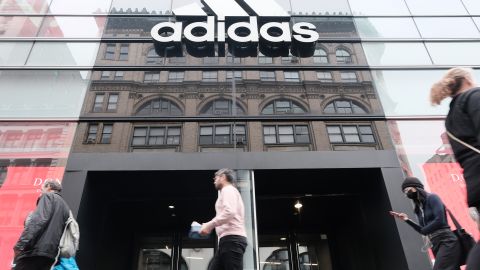New York
CNN Business
—
Earlier this week Adidas ended its partnership with rapper and fashion designer Ye (who previously went by Kanye West). Its decision came around the same time that a flurry of other companies also cut ties with the artist — but weeks after Ye began making offensive remarks.
Many wondered: What took Adidas and others so long?
After all, Ye’s behavior had been troubling for some time. He even called out Adidas directly during a podcast appearance in which he made antisemitic comments, bragging the company would never cut ties with him.
The latest saga began in early October when Ye wore a shirt with the slogan “White Lives Matter,” a statement that the Anti-Defamation League has linked to the Ku Klux Klan. At that time Adidas, which first partnered with the artist in 2013 for Yeezy-branded shoes and clothes, said it was reviewing the partnership.
Then, during an appearance on a “Drink Champs” podcast episode the weekend of October 16, Ye repeated antisemitic conspiracy theories among other offensive claims. He referenced Adidas directly: “I can say antisemitic things, and Adidas can’t drop me,” he said. “Now what?”
For several days, that appeared to be true.
Adidas didn’t announce it was severing ties with Ye until Tuesday, October 25, over a week after the podcast was released.
In that statement the company said it “does not tolerate antisemitism and any other sort of hate speech,” calling Ye’s recent comments “unacceptable, hateful and dangerous” as well as in violation of the company’s “values of diversity and inclusion, mutual respect and fairness.”
Adidas wasn’t the only company to take its time: Balenciaga cut ties with Ye last week, and while Gap and Ye parted ways in September, it didn’t pull the Yeezy Gap line from shelves until this week. Foot Locker also said this week that it would remove Yeezy products, and TJ Maxx followed by saying it would no longer purchase the items for sale in stores.
But Adidas took much of the spotlight following Ye’s comments on the “Drink Champs” podcast.
Why the delay? In such a situation, companies face a dilemma, said Andrew Gilman, founder and CEO of CommCore, a consulting group with expertise in crisis communication. On the one hand, they “have to be really fast,” he said. “At the same time, they want to be deliberate.”
When walking that tightrope, companies can slip. And a wrong move could have consequences for their finances and reputation.
It seems that the last straw for Adidas was an image that went viral this weekend. Photos from a Los Angeles freeway overpass show a small group of demonstrators with their arms raised in what appears to be the Nazi salute behind banners reading, “Honk if you know” alongside “Kanye is right about the Jews.”
As that image caught traction online, pressure mounted for Adidas to take a stance.
The incident “woke these companies up,” said Amy Shanler, associate professor of public relations at the Boston University College of Communication, referring not just to Adidas but to the other companies that cut ties with Ye this week. It made them realize “it’s not just Kanye talking to Kanye … there are other people who are listening.”
Those people, who affirmed Ye’s antisemitic message, are not ones companies want to be linked with. From their perspective,”we can’t be at all associated — even a second-degree association — with these hate groups,” Shanler said.
As for the previous incidents, Shanler noted that companies don’t always know how far is too far, even if critics have been calling them out. Plus, companies may fear that by addressing a controversial incident, they’ll end up publicizing it.
And they’re nervous about being the first to take a stance.
“When you’re the first, you become the most visible, you’re the first brand that everybody’s talking about,” Shanler said. “When you’re not the first, it’s a lot easier to join that bandwagon.”
And then, in Adidas’ case especially, there’s the financial fallout that results from severing ties.
Adidas will take a €250 million (about $249 million) in the fourth quarter because of the decision, the company said this week. Things could get worse from there, noted Douglas Hand, a fashion lawyer who is a partner in the firm Hand Baldachin & Associates.
“That’s just the short-term impact,” he said. “Kanye and Yeezy were a significant element of their revenues and profitability,” he noted. “They’re really, in effect, shuttering a brand that has been very, very successful for them.”
Yeezy products generated nearly $2 billion in sales last year for Adidas, 8% of the company’s total revenue, according to Morgan Stanley. The line helped Adidas attract new customers and get more shelf space in stores. (Adidas said it remains “the sole owner of all design rights to existing products as well as previous and new colorways under the partnership” with Ye.)

Adidas has a financial obligation to its shareholders. Before it abandons such a lucrative deal, it has to be sure that’s the right move.
Most public companies “are very much beholden to financial decisions, above and beyond decisions that might be more aligned with mission,” said Hand.
But there are costs to dragging your feet.
The company may sustain damage to its reputation. It’s not yet clear whether that will happen in this case, noted Gilman. “What they’ll lose depends on how strong the brand is to begin with,” Gilman said.
And by keeping quiet for days after Ye’s podcast apperance, Shanler said, Adidas “missed an opportunity to make a forceful and immutable statement in opposition to antisemitism.”
— CNN Jordan Valinsky, Sonya Hamasaki and Nathaniel Meyersohn contributed to this report.